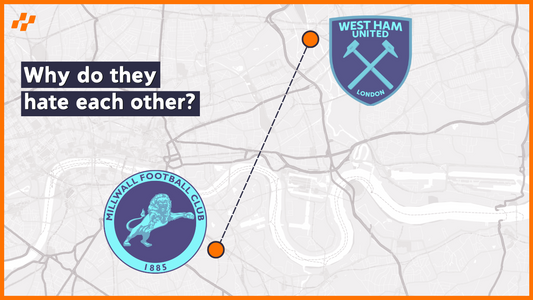
How The Bosman Ruling Changed Football Forever
Share
The Bosman ruling shook the foundations of football, leading to a revolution in player transfers.
In this article, we follow the epic journey of one man's fight for freedom, and discover how his actions shaped the sport we know today. Get ready for an unforgettable tale of determination and triumph.
Watch our YouTube video instead
How did it start?
Jean-Marc Bosman began his professional football career in the 1980s, playing for a number of teams in the Belgian first division. In 1990, he signed with RFC Liège, a team in the Belgian top flight.
However, in 1992, his two-year stint had not worked out as he had hoped and his contract with the team was coming to an end. Bosman decided to leave after the Belgian midfielder was offered an improved contract by French second division side Dunkirk.
Before the Bosman ruling, a player could not leave at the end of their contract unless that club agreed to let him go on a free, or that club received an agreed fee from a buying club.
RFC Liège therefore demanded Dunkirk pay a transfer fee for his services. The deal would eventually fall through, and Bosmans wages at Liege were cut by around 75 per cent.
Bosmans Case
Bosman argued that this practice was unfair and violated his right to free movement within Europe. He took his case to court, and in 1995, the European Court of Justice ruled in his favor, allowing a player to leave a club on a free transfer as soon as his contract expired, meaning they had leverage to demand huge signing-on fees and salaries from new clubs to make up for the absent transfer fee. This became known as the Bosman ruling.
The power was now with the players and their agents - in 2015 Sir Alex Ferguson stated "Once the European Court of Justice ruled that clubs no longer had to pay transfer fees after the expiration of a player's contract, all hell broke loose. Suddenly it was a free-for-all."
The Bosman ruling also had a significant impact on the “three plus two” rule. Pre-Bosman, In European competitions, teams could name no more than three foreign players in their squad for games on the continent, with an additional two who had progressed through the club's academy. Post-Bosman, clubs were free to play all EU players.
In the end, the Bosman ruling had a major impact on the world of football, but the Belgian's fight did more for other players than it did for himself, and despite receiving a £312,000 compensation package in 1998, he has since struggled with an alcohol addiction, as well as depression.
Since the ruling came into effect throughout the EU in 1995, several notable players in European football have benefited from the ruling. In 1996, Edgar Davids became Europe's first high-profile player to benefit from the ruling when he moved from Ajax to Milan.
In 1999, Steve McManaman became the most lucrative transfer at the time in British football, as "Britain's first high-profile Bosman departure", when he moved from Liverpool to Real Madrid and the deal resulted in McManaman becoming the highest paid British player in history, from 1999 to 2001.
Since Davids and McManaman, scores of other notable players became able to negotiate deals according to their market value when their contracts expired, a trend that carries out till this day.





